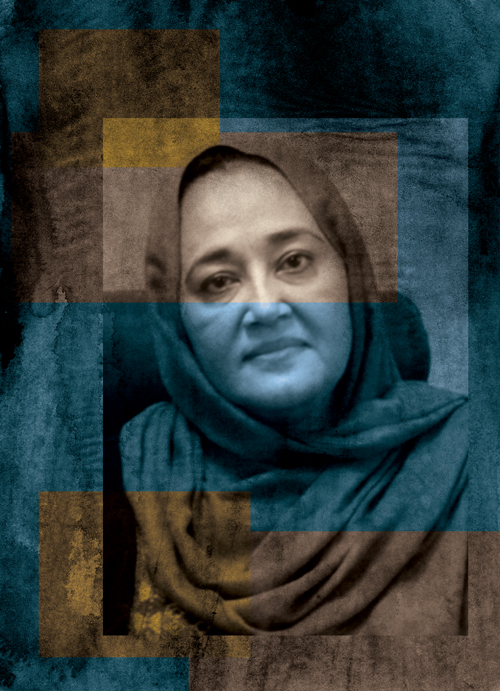Khadija Ghaznawi was the only woman who presented as a candidate for the 2014 presidential elections. She was disqualified from running by the Independent Election Commission. Born in Badakhshan, the largest and most underdeveloped province of Afghanistan, she describes herself as a peace activist. Ghaznawi is also a successful entrepreneur and President of the Ibrahim Asia Group of Companies.
Can you tell us about a time when your human rights were violated, something which has influenced your life?
Although I was very young during the rule of the People’s Democratic Party, I will never be able to forget the prison scenes that filled my life in those days. They arrested my father, my uncle, and my 11-year-old brother at a wedding, and took them all to prison. I remember vividly those years my father spent in prison. One day, we went to visit him in the prison, taking with us a meal we had prepared for him. I remember the guards driving dirty sticks into the food, then throwing it on the ground and chasing us away. As we ran away, the thorns pierced our feet. I can still feel the pain.
Another memory I’ll never forget is when my uncle, also in prison, arranged for me to be married. He sent me a letter of congratulations from the prison. My fiancé was living in Pakistan at the time, and so I migrated there.
What gives you hope in the new era? What do you see as a positive development?
The improvements regarding women’s legal status and rights in the past 10 years, and the new opportunities available to women, are positive developments. But the extent to which women have been able to benefit from these opportunities is a different question. Another positive development is the gains made with respect to education, especially higher education.
What are some of the most important achievements since the time of Taliban?
Some of the best achievements are the support coming from the international community and the government of Afghanistan for women, and the new opportunities for women to access employment and education.
What is your worst fear today?
I’m extremely concerned about the extensive corruption in all aspects of government. The people of Afghanistan must understand that this is their country and they have to take responsibility for solving its problems. The lack of security is another major concern. I believe that we can achieve everything we want through peace.
What are the biggest challenges facing Afghanistan?
I still come back to the lack of security as the most important problem. Without security, nothing else will be achieved. We have abundant natural resources in Afghanistan, but tragically we lack the know-how and facilities to extract and benefit from them.
Achieving peace is another major challenge that the people of Afghanistan must confront. The key to peace lies within Afghanistan, not outside. Peace will only be achieved through unity of the men and women of Afghanistan.
Would today’s Afghanistan allow schools to once again be closed to girls and women to be excluded from social participation?
Things are different today from how they were 10 years ago. The young people and women of Afghanistan are strong and they will not allow a repetition of the past and the exclusion of women from the schools, bazaars, and public places.
What are some of the key factors which deter women’s participation in social, economic, political and cultural spheres?
The barriers women face in accessing education, especially higher education, is a major factor. Additionally, there is the traditional patriarchal system, which takes root in the homes of Afghanistan and spreads up throughout the higher levels of society. This is closely linked with improper interpretation of religious texts, and the perpetuation of destructive, outdated customs.
What are some of the major changes women want to see?
Women want to see more effective implementation of the laws that affect them. They want to enjoy better opportunities for education and employment, and be able to make independent decisions about marriage.
What the sources and centres of power which women can rely on to promote their rights and demands?
The Afghanistan Independent Human Rights Commission, the civil society institutions, especially the Women’s Council, and the educated and progressive men, to name but a few.
What have you done in your personal and professional life to fight against obstacles to women’s participation in Afghanistan?
I believe that every person can bring peace to their environment. For me, it is so important to hear orphans laughing. I have a special understanding for orphans because my children grew up without their father; I have experienced what it means to suffer as a widow. I used the revenue of a guesthouse that I ran to pay for medical treatment of orphans. In general, I have been involved in a number of peace projects across a range of sectors – in health, in education, in all provinces of the country.
Do you have a specific message?
My message to all of the people of Afghanistan, both at home and abroad, is that they should return home and join their hands and work together to create a developed and free country where all people live in peace.
“Unveiling Afghanistan, the Unheard Voices of Progress” is a campaign by Armanshahr and FIDH, which explores views held by Afghan civil society actors. Over 50 days, 50 influential social, political, and cultural actors hope to spark conversation and debate about building a society that is inclusive of women’s and human rights in Afghanistan.
Follow 50 interviews drawn from the “Unveiling Afghanistan campaign” daily on the Huffington Post.
Follow Unveiling Afghanistan on FIDH Twitter: www.twitter.com/fidh_en


